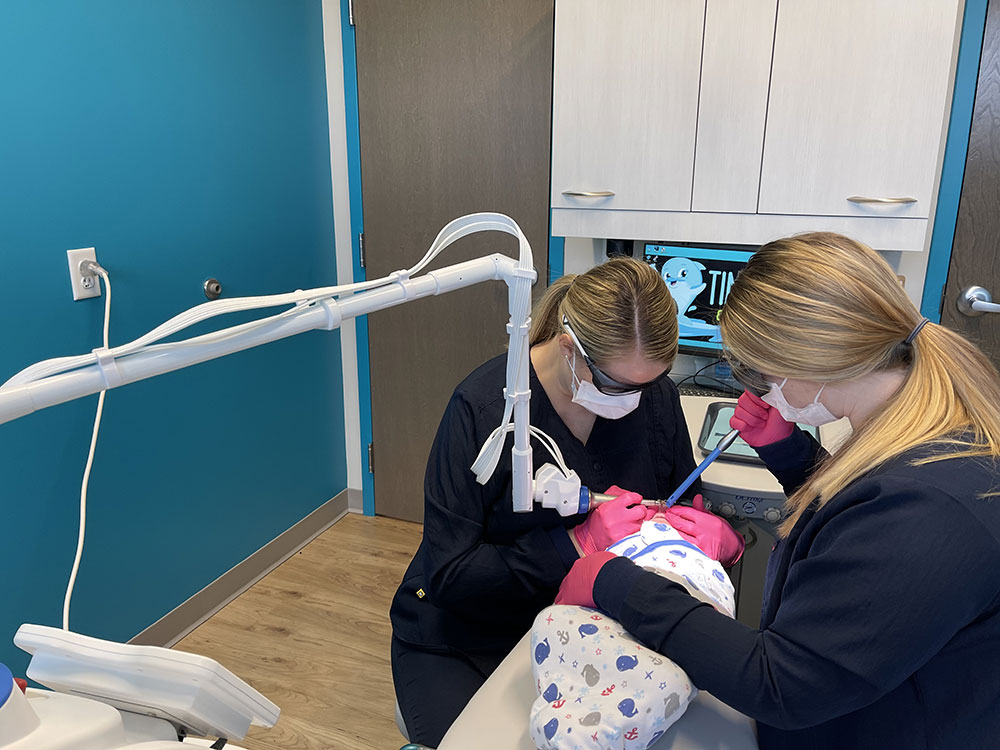Frenectomy/Frenotomy

In the mouth, there is a soft band of tissue that connects your lips, cheek and tongue to your jaw bone. This band of tissue is called the frenum.
Sometimes, people are born with thicker than normal frenums which can prevent proper functioning of the mouth. Usually, this thicker band of tissue is found above your two front teeth connecting to the top lip, or beneath the tongue.
Having a thicker frenum can cause a condition known as tongue-tie/lip-tie. For infants with abnormal ties there can be many difficulties with breastfeeding. Infants and children can also experience challenges with eating, speaking, sleep and swallowing.
Click here to see examples of some of the issues we commonly see.
If you notice that your child has difficulty speaking or is experiencing any of these symptoms, give us a call today at Tiny Ties of Columbus to talk about the possibility of a frenectomy and so we can answer any questions you may have.
Effects on Speech
An evaluation by a speech pathologist may be needed if more than half of a four-year-old child’s speech is not understood outside of the family circle. A child with a tongue-tie may have a lisp or have difficulty speaking when tired.
Although there is no obvious way to tell in infancy which children will develop speech problems, a tongue-tie will make speech problems more likely. Some children can compensate for the restrictions, but the sounds may be harder to produce with a restricted tongue. Difficulties associated with the following letters may signify a posterior tongue tie: L, R, T, D, N, TH, SH. When speech presents with increased effort or speech problems are consistent through most sounds, a more anterior tongue tie may be present.
Effects on Feeding
Does your child eat slowly? Is your child very picky, especially with textures? Sometimes these problems can continue into adulthood. A child with a tongue-tie may choke, gag, or spit food out. They may refuse to wean from breastfeeding or bottle feeding because they cannot tolerate solid food. They can have difficulty swallowing which can prolong meal times and lead to grazing on food throughout the day. The textures that are often difficult are purees, meats, and other soft mushy foods, but any food could be difficulty if the restriction is significant enough. Of course, not every feeding problem is a result of a tongue-tie, but this issue can be easily overlooked to the untrained eye.
Effects on Teeth
Spacing in children’s primary/baby teeth is ideal but for older children with permanent teeth, an upper lip-tie can cause significant spacing and be an esthetic issue. When the frenum is properly released during infancy, it is possible to prevent issues with spacing. This procedure can also be completed at a later age before the adult teeth come in (7-8 years old). A tongue-tie or lip-tie can also pull against the gums and cause recession. A low and thick lip-tie may trap food and create an obstacle when brushing teeth, which can lead to poor oral hygiene, and cavities.
Effects on Sleep
A tongue-tie can cause the tongue to sit towards the back of the throat during sleep and can cause the airway to be obstructed. The tongue is supposed to rest forward at the roof of the mouth during sleep. If this position is incorrect, this can cause grinding, snoring or sleep-disordered breathing. Sleep-Disordered breathing can cause restlessness, frequent waking, and bed-wetting. We have found that when there is a tongue-tie, sleep often improves dramatically after a simple in-office procedure.
Click here to see some of our patient before and after photos.

